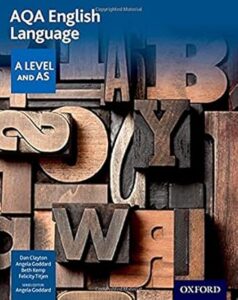- A level Courses
- Biology A level
- Business A level
- Economics A level
- English Language A level
- English Literature A level
- French A level
- History A level
- Law A level
- Mathematics A level
- Psychology A level
- Sociology A level
- Spanish A level
English A level
This English Language A level course matches the AQA specification for examination in June 2022 and later years.
This course has been designed to match the new AQA English Language Specification 7701/7702. This brand new specification has been designed to allow students to develop a wide range of skills. These include
- critical reading
- data analysis
- evaluation
- the ability to develop and sustain arguments
- writing skills
The skills developed are invaluable in the work place and will greatly aid students progress to any form of future study.
Module One- Introduction to Language Analysis: Language Frameworks
Module one of the course introduces you to the analytical frameworks used in linguistic study; lexis, semantics, grammar, phonology and discourse. This approach is sometimes referred to as ‘language as system’.
Module Two: Textual Variations and Representations
Building on language frameworks from Module One: Modes of Address. These are ways into individual texts to help you develop a firm understanding of how language is used in a particular context.
Module Three: Language Diversity
Module Three of the course introduces you to the sociolinguistic frameworks used in linguistic study
Module Four: Language Discourses
Students will study a range of texts that convey attitudes to language diversity and change. The texts will include those written for non-specialist audiences. Students will explore how texts are produced to convey views and opinions about language issues. They will evaluate how texts represent language, constructing an identity for the producer. The connections to wider language discourses will be examined.
Module Five: Language in Action: Investigating Language
The lessons in this module are designed to support you in your preparation for the first element of the ‘Language in Action’ coursework unit, the Language Investigation. This forms an integral part of the A-level assessment.
Module Six: Understanding Children’s Language Development
This module is concerned with how children acquire language
Module Seven: Applying Theories of Language Development to Analysis of Speech and Writing
This module is concerned with the development of children’s literacy. The lesson begins by considering the relationship between literacy and the development of spoken language. Models of early and emergent literacy from the field of cognitive development are explored. some of the main aspects of early literacy development are identified. There are opportunities to examine examples of emergent writing from domestic and formal settings.
Module Eight: Language in Action – Original Writing
The original writing element of your coursework folder will allow you to demonstrate your practical and creative language skills. You may produce a piece of work which is either fiction or non-fiction. Work may include articles and texts designed to be spoken.
Module Nine: Introduction to Language Change
Change is taken to refer to the ways in which language develops over time diachronic change, while diversity is used to refer to varied uses of English at any given time also known as synchronic change.
Module Ten: Evaluating Language Change
Module ten builds on the knowledge and skills developed in Module Three (Sociolinguistics). Sociolinguistics is the study of language and society. In this module, you examine the rich variety of English in use today.
The course prepares students for the AQA English Language AS and A level specification. 7701/7702.
The Full A level is examined by two written examinations of 2 hours and 30 minutes and two pieces of coursework.
Paper 1: Language, the individual and society – 100 Marks 40% of the A level
What’s assessed
• Textual variations and representations
• Children’s language development (0 – 11 years)
• Methods of language analysis are integrated into the activities
Paper 2: Language diversity and change – 100 Marks 40% of the A level
What’s assessed
• Language diversity and change
• Language discourses
• Writing skills
• Methods of language analysis are integrated into the activities
Non-exam assessment: Language in action – 3500 words, 100 marks 20% of the A level
What’s assessed
• Language investigation
• Original writing
• Methods of language analysis are integrated into the activities
Tasks
Students produce:
• a language investigation (2,000 words excluding data)
• a piece of original writing and commentary (1,500 words total)
Please note that the marking and moderation of NEA (coursework) by OOL tutors is included in the course fees – this is not true of other providers.
Students would normally be expected to have a minimum of 4 GCSE passes at grade C/4 and above. This course is very technical and students should have a grade B/6 or above in GCSE English Language.








